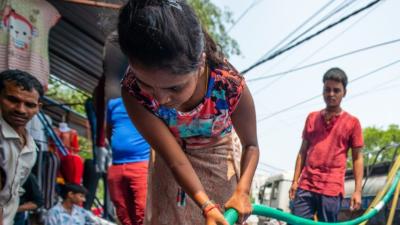
Improving access to redress for workers vulnerable to violence and harassment in South Asia
Experts discuss the factors that make some workers more vulnerable than others to violence and harassment.
This page is approximately a 4 minute read
This page was published on

The findings come from the latest report from the Lloyd’s Register Foundation World Risk Poll, powered by Gallup: ‘A Resilient World? Understanding vulnerability in a changing climate’. It presents data from over 125,000 people in 121 countries and reveals how people feel their communities and their country’s infrastructure and government can cope in the face of disasters.
Indians live in one of the global regions most frequently subject to disasters (such as those caused by flooding, hurricanes, tornadoes and wildfires), with three in 10 (30%) people in Southern Asia having experienced at least one in the past five years, the fifth highest regional rate in the world. Despite this, respondents in India have shown high levels of confidence in both their government and families to cope with such disasters. For instance, more than three quarters (77%) of Indians believe their family is well-prepared to deal with a disaster (much higher than the global average of 54%), and more than two thirds (68%) feel the same way about their government (more than the global average of 42.6%), according to the World Risk Poll data (collected in 2021).
Yet India, as well as the rest of the Southern Asia region, has scored modestly on the Poll’s Resilience Index, which is calculated between 0 and 1 and takes into account the individual, household, community and society resilience of a country. India’s 0.52 score is below the world average of 0.55, with some significantly low scores across both individual resilience (0.36, below the 0.46 world average) and household resilience (0.37, below the 0.54 world average). This highlights a potential public perception gap when it comes to India’s ability to cope with disasters.
Additional data from the Poll further highlights how the lack of resources, and the way they are spread across various demographics, effectively limit India’s resilience. Nearly two thirds (62%) of the population has gone without electricity for more than a day over the past 12 months, and a breakdown by income group reveals severe disparities when it comes to accessing vital resources. Three quarters (75%) of the poorest 20% in India have gone without electricity for more than a day in the past 12 months, compared with only 43% of the richest 20%. Similar disparities can also be seen across other resources – including access to clean drinking water and medical supplies.
When asked how long they could cover their basic needs for should they lose their income (for instance, as the result of a disaster), the majority of Indians (59%) said they would only be able to do so for less than a month – including over a quarter (26%) who said their resources would stretch for less than a week.
Dr Sarah Cumbers, Former Director of Evidence and Insight at Lloyd’s Register Foundation, said: “The World Risk Poll is designed to provide insight for policymakers into which risks are most affecting the lives of populations across the world, and our findings will help them work with communities to improve resilience in the face of increasingly common natural hazards.
“The latest World Risk Poll suggests Indians may be overconfident in the country’s ability to cope with disasters. Many feel the country’s infrastructure, as well as their families, are well prepared – yet the data suggests there is more work to be done, as illustrated by India’s relatively modest Resilience Index score.
“Many people in India have gone days without vital resources, and many feel they may not be able to cover for their basic needs for long should they lose their income – for instance, in a disaster situation. This must be addressed through policies that take into account the vital role financial security places in resilience, especially in light of other disasters currently affecting the region.”
Download the report here. Download the India country snapshot here. Country-specific data snapshots for all other countries in the Poll are also available here.
Funding is available from Lloyd’s Register Foundation for further research and interventions using World Risk Poll data to reduce risk and improve resilience. Find out more here.